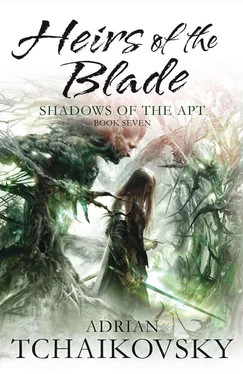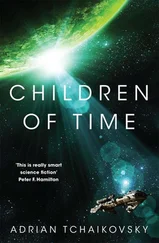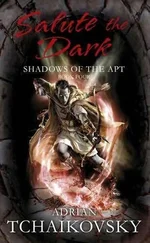Adrian Tchaikovsky - Heirs of the Blade
Здесь есть возможность читать онлайн «Adrian Tchaikovsky - Heirs of the Blade» весь текст электронной книги совершенно бесплатно (целиком полную версию без сокращений). В некоторых случаях можно слушать аудио, скачать через торрент в формате fb2 и присутствует краткое содержание. Жанр: Фэнтези, на английском языке. Описание произведения, (предисловие) а так же отзывы посетителей доступны на портале библиотеки ЛибКат.
- Название:Heirs of the Blade
- Автор:
- Жанр:
- Год:неизвестен
- ISBN:нет данных
- Рейтинг книги:4 / 5. Голосов: 1
-
Избранное:Добавить в избранное
- Отзывы:
-
Ваша оценка:
- 80
- 1
- 2
- 3
- 4
- 5
Heirs of the Blade: краткое содержание, описание и аннотация
Предлагаем к чтению аннотацию, описание, краткое содержание или предисловие (зависит от того, что написал сам автор книги «Heirs of the Blade»). Если вы не нашли необходимую информацию о книге — напишите в комментариях, мы постараемся отыскать её.
Heirs of the Blade — читать онлайн бесплатно полную книгу (весь текст) целиком
Ниже представлен текст книги, разбитый по страницам. Система сохранения места последней прочитанной страницы, позволяет с удобством читать онлайн бесплатно книгу «Heirs of the Blade», без необходимости каждый раз заново искать на чём Вы остановились. Поставьте закладку, и сможете в любой момент перейти на страницу, на которой закончили чтение.
Интервал:
Закладка:
Capitas: Now
There had been many changes in Capitas over the last few years. It was the Empire in miniature, and the Empire had been forced to deal with a great deal of turmoil since the strength of its armies had broken at Collegium and Sarn, Myna and Solarno and elsewhere. The ill-educated, within the Empire and without, claimed that the death of the Emperor had been the blow that rocked the Empire, but just as the death of a general would not halt an Imperial army, so the death of Alvdan II would have been nothing but a footnote in history, if only his armies and his battle plans had been sounder.
After the end of the external war had come the internal: renegade governors refusing to acknowledge Seda, setting themselves up as their own masters. The Empire had teetered on the brink of a disintegration that would have taken it back to its feuding tribal origins of three generations before.
That the Empire had survived to regain its territory and its strength was due to two saviours. One was embodied in Seda, her sharp mind and her adroit handling of both her allies and her enemies ensuring that she was never forced into a position from which only force could extricate her. The second saving factor was the other kinden, the Wasps’ second-class citizens.
There had always been a fair number of Beetle- and Fly-kinden in the Empire, and they were counted Imperials of a sort, not as good as Wasps but better than the rest. While the Wasp-kinden ran their armies, the Beetles and Flies tended to find work as clerks and merchants and administrators, and when the Empire had cracked apart, they had stepped into the breach. The efficiency of the Consortium of the Honest, of the Quartermaster Corps, the Engineers, the Capitas bureaucracy, had proved the glue that held the Empire together, and that was able to re-join each piece seamlessly. No demands were made, no threats, but by the end of the insurrection there was a notable number of influential Beetles and Flies who had found promotion and power, as well as the covert gratitude of the Empress.
But there was more than that. The doomsayers had predicted a hundred revolts, every enslaved city striving for its freedom. In truth, except for the cities of the West-Empire – Szar, Maynes and Myna in their new Alliance – the majority of the cities to rise up were those whose governors had forced the issue. The enemies of the Empress had turned out to be other ambitious Wasps rather than her subject peoples. There had been a few attempted rebellions, but most of the subject cities had otherwise simply gone about their business. In the aftermath, Seda made sure to reward both governors and slave-subjects for their loyalty, just as she had punished treachery without mercy or hesitation.
One result of this new mood within the Empire was that Capitas’s citizens were taking a keener interest in the subjects of their Empire, which in turn had led to the founding of the Imperial Museum. It was a Collegiate concept of course, though the Lowlander Beetles preferred exhibits representing the domains of the historian, naturalist or artificer. The Imperial Museum was just that: a museum of the Empire. The building itself was still being constructed, half of its halls and wings still just foundations surmounted by the skeletons of scaffolding, but the completed sections had already seen a brisk trade of fascinated Wasp-kinden come to learn more about their slaves and servants.
There was a Bee-kinden wing, where artefacts from the city of Vesserett were on display: their graceful yet functional carving, their elegant illustrated scrolls, all the trappings of their emergent power from the days in which they had been the nascent Empire’s first challenge. There was a hall of Grasshopper-kinden art from Sa, where slave musicians would play on certain days. There was a cellar tricked out to look like a Mole Cricket-kinden dwelling from Delve. There were three halls devoted to the Commonweal, one lined with the swords and armour of two score Dragonfly nobles, all of it recovered during the war, and many displaying the damage that had done for their original owners. The Wasp-kinden strolled through these rooms and learned a little about those far-flung cultures, those disparate peoples, but most of all they learned how they were superior because these things were all the spoils of conquest. It was the same lesson as taught by the deaths of foreign combatants in the arena, but more lasting.
The Empress herself had made her fondness for this establishment widely known, and the Beetle-kinden Consortium family who were behind it had been richly rewarded. It was well known, indeed, that after dark, when the museum was locked up, she would use its empty halls to speak to those who had particularly attracted her notice. It was, everyone knew, a sign of great favour.
Her companion tonight was one Major Karrec, a man of good family and good standing in the Consortium. As she paced the length of the Commonweal hall, the vacant helms of fallen nobles regarding her gravely from either side, he regaled her with stories of his war exploits and his cleverness in the face of the enemy. He was a man of middle height, running slightly to fat from a life far from rigorous, but there was a spark about him, she thought. As there should be.
Behind the two of them, a pair of her Mantis-kinden bodyguards paced silently, the metal claws of their gauntlets folded back.
He smiled at her, did Karrec, and walked closer than was appropriate, and she realized that he was crossing that old familiar line, as she thought he might. As the Empress, on high, she was only female in the abstract, but if she allowed her underlings any familiarity, then some of them would begin to treat her as women had always been treated in the Empire: as something to be possessed and controlled.
As they reached the end of the hall, Karrec stopped and stared. He had been discoursing on some of the suits of mail, obviously familiar with the exhibits, but now he frowned. ‘Your Imperial Majesty, forgive me. I don’t recall a hall beyond this one.’
‘It is not for public viewing yet, Major,’ she said sweetly. ‘However, I have asked our curators to open it tonight, just for us.’
He was encouraged by that, she saw, and she wondered just how deluded he might be about his prospects. Still, it was all to her advantage, so she let him dream while he could.
The chamber beyond was small compared with the museum’s other halls, a simple box of a room that seemed as though it had been left to moulder for decades, until the walls had grown a patina of mould and lichen, the plaster decaying and falling away to turn the smooth surfaces into a maze of canyons and eroded topography, all of it made to shiver and move under the light of two ensconced torches. Karrec was not quite so oblivious as to take that sight in his stride, and he hesitated in the doorway, until she turned back and smiled at him.
‘A remarkable effect, yes? I understand the craftsmen laboured at it for days.’
‘But what is it for?’ he asked, entering cautiously.
‘This is the Mantis-kinden hall,’ she explained. ‘It is small, as there are few such in the Empire, but they possess a fascinating culture nonetheless.’
He glanced back at the two guards, who had stopped at the doorway. ‘And they’re friends to the throne now, I see.’
‘Oh, they were gifts from the clever Moth-kinden of Tharn,’ she explained. ‘Half a dozen Mantis-kinden warriors to guard me from enemies both within and without the Empire. As if I would take such a gift unquestioned. Spies, of course, for their masters in the mountains, their loyalty already pledged before they were sent to kneel to me. However, I have shown them where their true path lies, so they are mine now.’ As Karrec would surely question that, she took up a torch and brought it over to her prize exhibit, hearing his astonished gasp. As a Consortium man, and a man of independent wealth, Karrec was a collector. She took it on faith that he would already be placing an exorbitant price on what she was showing him.
Читать дальшеИнтервал:
Закладка:
Похожие книги на «Heirs of the Blade»
Представляем Вашему вниманию похожие книги на «Heirs of the Blade» списком для выбора. Мы отобрали схожую по названию и смыслу литературу в надежде предоставить читателям больше вариантов отыскать новые, интересные, ещё непрочитанные произведения.
Обсуждение, отзывы о книге «Heirs of the Blade» и просто собственные мнения читателей. Оставьте ваши комментарии, напишите, что Вы думаете о произведении, его смысле или главных героях. Укажите что конкретно понравилось, а что нет, и почему Вы так считаете.












